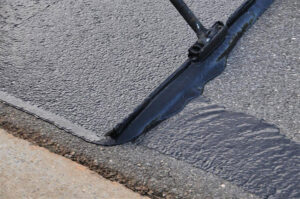The Deterioration of Asphalt
Although it is often called asphalt for the sake of convenience, asphalt concrete consists of mineral particulates bound together using the viscous substance called asphalt, which is one of the distillates of the petroleum refining process. The resulting material is strong and long-lasting while remaining inexpensive to use and simple to install, which make it the perfect choice for paved surfaces that are expected to see a lot of traffic over the course of their existence.
However, even the best asphalt will deteriorate over time, resulting in chips and cracks spreading through paved surfaces. Such sights are unpleasant to see, making it that much harder for businesses to sell their products and services. Worse still, their presence can impair the function of paved surfaces, which can be an even bigger problem.
What Causes the Deterioration of Asphalt?
To combat the deterioration of asphalt, it is important to understand the causes behind it:
- Water is one of the most common causes of asphalt deterioration. In part, this is because water that manages to seep past the surface can wreak havoc with the base that provides so much of the asphalt’s support. However, it is also important to note that water can cause the oxidation of the asphalt that holds asphalt concrete together, making it more brittle and thus more prone to cracking.
- Likewise, constant exposure to the UV radiation contained in sunlight can cause oxidation as well. This is particularly problematic because bigger cracks means more water seeping into the base, which will slowly but surely increase the asphalt’s rate of deterioration over time unless corrective action is taken.
- Changes in temperature can also cause chips and cracks in asphalt. This is because higher temperatures cause substances to expand while lower temperatures cause substances to contract. Over time, this cycle of expansion and contraction can cause the asphalt to come apart, particularly if it has been made brittle by other environmental factors such as moisture and sunlight.
- Certain chemicals such as gasoline can cause asphalt to soften and lose its strength, making it less capable of holding the mineral particulates together. Some of these chemicals can even saturate the asphalt, causing extensive damage in the long run even once they have been cleaned off of the paved surface.
- Finally, asphalt will break down naturally over time, causing it to lose its elasticity as well as its moisture resistance. This makes the asphalt even more susceptible to the environmental factors listed here, thus causing it to deteriorate faster and faster.
So How Can We Help?
There is much that ARM Pavement Services can do to extend the useful lifespan of asphalt. For example, our team can fill cracks and provide a new application of the seal coating responsible for repelling water and other chemicals. To learn more about how our parking lot maintenance services can help, please contact us to speak with a member of our team.

